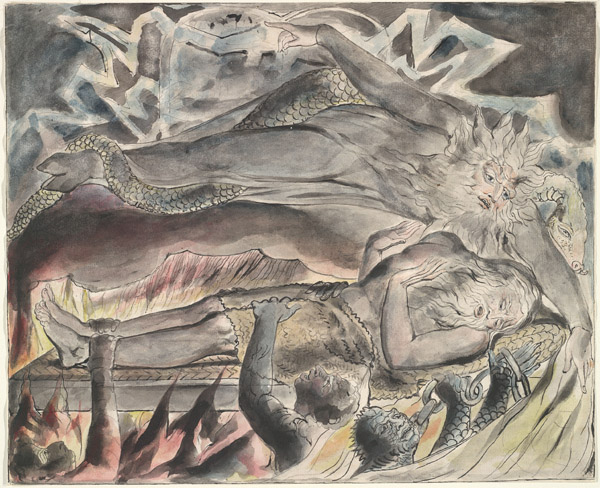 |
| Wikipedia Commons Job's Evil Dreams Page 11 Linell set of Blake's Illustrations of the Book of Job |
A nightmare:
Job 7
13 When I think my bed will comfort me and my couch will ease my complaint,
14 even then you frighten me with dreams
and terrify me with visions,
An excellent resource for studying Blake's Illustrations to the Book of Job is this website:
Jung, William Blake and our answer to Job by David Hiles. (Ellie's May 30, 2009 post entitled "Job's Image of God")
Speaking of Blake's overall structure and emphasis in his presentation of Job, David Hiles says:
"... it is clear that Blake makes a significant departure from the biblical text in terms of both the structure and emphasis of the series of plates. He eschews the cycle of speeches which occupy approximately 34 of the 42 Chapters of The Book of Job. Instead, Blake seems to concentrate on Job’s experience, and process of transformation. Blake also significantly expands the final stage of Job’s transformation, the stage of Return. Blake here seems to be acknowledging both his creative work and his own experience of suffering, i.e. through his work as a poet, artist and engraver, he is able to offer up a creative synthesis as an authentic expression to his readers."
Text and images are provided by Boston College.
Plate 11 When you click on this illustration you will see the watercolor painting which corresponds to it.
The 11th of the 21 pictures is the midpoint and illustrates the lowest psychological point that Job reaches. Job is shown prostrate and vulnerable in the center of the picture; above him is Satan masquerading as God as he points to the stone tablets of the law. The cloven hoof and the encircling serpent reveal his identity as Satan. The background is the chaos of the abyss. Below Job, who lies on a slab as if to be sacrificed, are fearful images taking hold of Job's body. Notice the flames the scaly arm the chains and the distorted faces. The mind and body of Job are assaulted by forces beyond his control, but Blake does not acknowledge that those forces represent the work of God.
Blake provides Biblical quotes to describe experience of Job which he is illustrating:
My bones are pierced in me in the night season: and my sinews take no rest (Job xxx: 17).
My skin is black upon me, and my bones are burned with heat (Job xxx: 30).
...the triumphing of the wicked is short, and the joy of the hypocrite but for a moment (Job xx: 5).
...for Satan himself is transformed into an angel of light....his ministers also be transformed as the ministers of righteousness (Second Corinthians xi: 14-15).
Then thou scarest me with dreams, and terrifiest me through visions (Job vii: 14).
Why do ye persecute me as God, and are not satisfied with my flesh? Oh that my words were now written! oh that they were printed in a book! That they were graven with an iron pen and lead into the rock forever! For I know that my redeemer liveth, and that he shall stand at the latter day upon the earth: And though after my skin worms destroy this body, yet in my flesh shall I see God: Whom I shall see for myself, and mine eyes shall behold, and not another; though my reins be consumed within me ["though consumed be my wrought Image" in above text] (Job xix: 22-27)
Who opposeth and exaulted himself above all that is called God, or that is worshipped (Second Thessalonians ii: 4).
The Biblical quotes (with locations identified in the Boston College website) make it possible for us to understand some of what Blake wishes to convey in this plate. As portrayed by Blake, Job in his extreme condition, is able to recognize that a vengeful punishing God who would be the source of such pain and suffering, is not the God who is the object of his worship. He recognizes that this image of God which has been distorted by his suffering, does not describe his relationship to God: Satan can't be given the power to define God. The terrifying vision does not negate the redeeming God whom Job knows will preserve the eternal man who sees God with his own eyes. Satan is not to be exalted above God himself.
Blake sees this point in Job's experience as a revelation that Job must revise the whole pattern through which he himself views God: that he must reestablish a relationship with God which is not controlled by the legalistic Satanic paradigm of reward for obedience and punishment for failure. In the next ten plates Blake reveals the process of rebuilding Job's psyche and his experience of the nature of God.
No comments:
Post a Comment